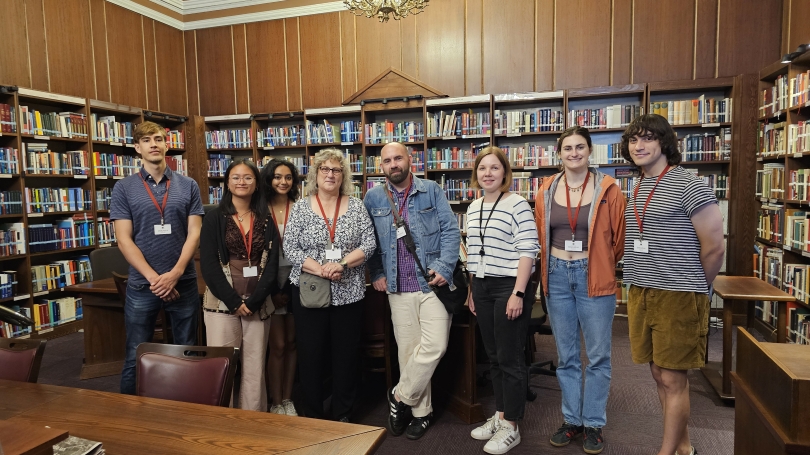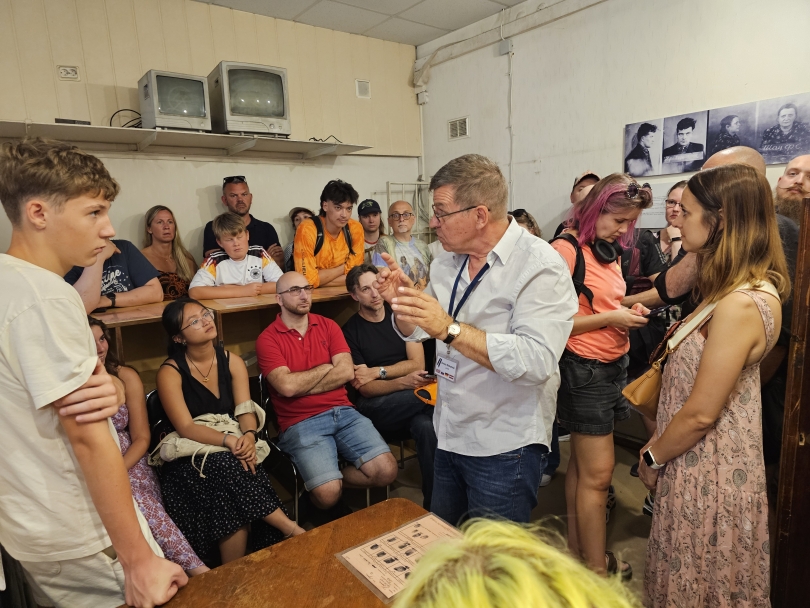For the ten Dartmouth students who traveled to Latvia, Lithuania, and Estonia in summer 2024 as part of the Baltic LEAP (Language, Energy and Politics)–a Foreign Studies Program (FSP) co-sponsored by the Irving Institute, the Department of Government, and the Department of Eastern European, Eurasian, and Russian Studies (EEERS) – the ten-week cultural and academic journey shifted perspectives and learning paths.
"Studying in the Baltics this summer transformed my educational experience at Dartmouth. As an Environmental Studies major, I was able to learn more about career options in the energy sector while also learning more about the government and policy side of the renewable transition. It was especially interesting to discuss these topics in the Baltics as these countries are doing a lot of work in the energy sector. Not only did I get to see Lithuania, Latvia, or Estonia for the first time, it was an experience unlike any other I've ever had or perhaps ever will again." –Minelle Jeddy '27
The distinctive perspectives of these Baltic nations arise from their unique geographic location, situated between Europe, Scandinavia, and Russia, and their complex geopolitical history, from the Russian Empire to Nazi and Soviet occupations, to modern independence. This context offered a rich and compelling example of how energy and political transitions are taking place globally. All participants in the program took an overview course on Baltic culture and history, taught by EEERS professor Mikhail Gronas, with frequent contributions from local guest experts. Two students pursued intensive Russian language study, while the other eight focused on energy and government.
The students in the energy and government track enrolled in Baltic Energy Systems and Transitions, a three-module course with segments at Vilnius University in Lithuania, Tartu University in Estonia, and in Riga, Latvia. The course explored social, economic, and environmental dimensions of energy transitions in the Baltics, which have been accelerated in recent decades due to geopolitical and energy security pressures. Students examined how the histories and futures of Baltic energy systems are shaped by the region's proximity to and complex connections with Russia and the Soviet Union, eastern Europe and the European Union. Student feedback on the energy coursework showed that many were inspired by what they learned.
"When I applied to the Baltics LEAP FSP, I associated the program most strongly with the government department. I had no idea the roots Irving had in the study abroad and the opportunities provided to enhance students' curiosity of renewable energy. After a month of studying how Putin weaponized natural gas imports to the Baltics and Lithuania fought back with energy-efficient solutions, like renewable energy infrastructure and Klaipėda's Liquified Natural Gas (LNG) terminal, I declared an ENVS minor. Beyond opening my eyes to the new frontiers of warfare (energy and cyber) in the Baltics, I am also eager to deepen my presence in Irving by enrolling in the Electricity Grids and Markets Bootcamp." – Maria Proulx '26
This year's program included extended time in Latvia and featured two new guest speakers: Andris Piebalgs, former European Commissioner for Energy and former adviser on Latvia's presidency of the Council of the EU, and Reinis Aboltins, energy market analyst at the Public Utilities Commission of Latvia. The group also toured the Salaspils Siltums municipal power plant, one of the largest solar district heating systems in Eastern Europe, which operates with 70% biomass energy and 20% solar thermal, supplemented by natural gas for stability. The plant is currently engaged in discussions about expanding its capacity to power future industrial facilities.
Students learned in Lithuania that energy plays a crucial role in the nation's identity, with a commemoration each April 15th to celebrate the opening of its first power plant in 1892. In Vilnius, Lithuania's capital, the Energy and Technology Museum–housed in a former power plant–provided students with insights into the complexity and inner workings of power generation. Learning the principles behind one power plant aids in understanding others, as the fundamental concepts of matter being heated and converted to electricity remain consistent across different plants.
Foreign study is a big part of how Dartmouth serves as a 'basecamp to the world,' with more than 60% of Dartmouth students participating in at least one study abroad experience during their student careers. Living and learning internationally helps students learn how to navigate and thrive in diverse cultures–a critical pathway toward global connections that will advance sustainable futures for all. Many employers recognize that students who have studied abroad have increased maturity and sharper skills in problem-solving and collaboration. Hosts for the Salaspils power plant visit specifically identified the capacity to collaborate with people across differences as a critical skill that today's students should be developed in order to lead innovation as professionals in the energy transition.


